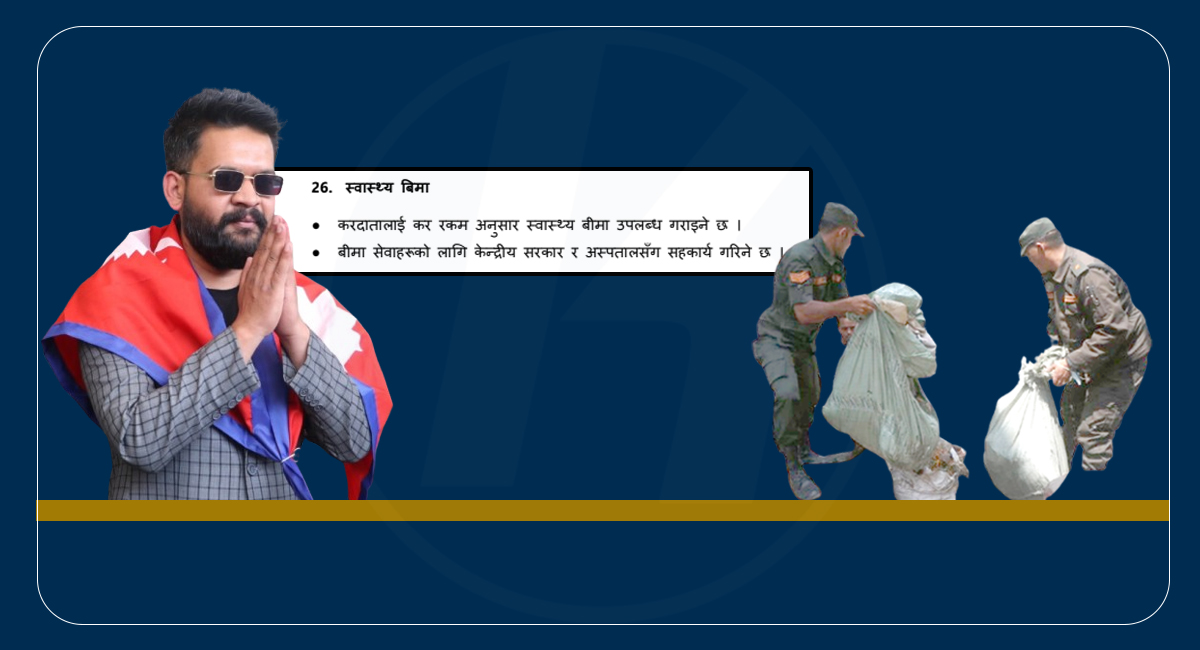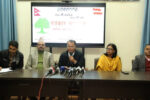KATHMANDU: The number of taxpayers in Kathmandu Metropolitan City (KMC) has been steadily rising, with more businessmen joining the tax net.
However, Mayor Balendra Shah (Balen) has yet to address the facilities he promised to provide to entrepreneurs during his election campaign.
From the fiscal year 2078/79 to the fiscal year 2080/81, as many as 77,943 new businesses have registered with Kathmandu Metropolitan City.
During this period, the metropolis generated a revenue of 1.024752 billion rupees from new business registrations.
According to data from Kathmandu Metropolitan City, the breakdown is as follows: in the fiscal year 2078/79, a total of 29,964 new businesses were registered; in 2079/80, 21,225; and in 2080/81, 17,723.
As of the fiscal year 2081/82, 9,311 new businesses have joined the tax net.
This data shows a steady increase in the number of businesses contributing to the metropolis’ revenue.
“We do not grant membership to those who are not registered with the metropolis. This way, when challenges arise, it will be easier for us to offer support. Our campaign has directly and indirectly contributed to an increase in business registrations.”
In terms of both new registrations and renewals, the number of entrepreneurs joining the tax net has been rising year on year. In fiscal year 2078/79, 44,783 entrepreneurs joined; in 2079/80, 53,465; in 2080/81, 59,986; and as of Magh 21 in fiscal year 2081/82, 42,977 entrepreneurs have registered.
From new businesses and renewals, Kathmandu Metropolitan City has collected the following revenues: Rs. 423.785 million in fiscal year 2078/79, Rs. 608.113 million in 2079/80, Rs. 687.644 million in 2080/81, and Rs. 404.465 million as of Magh 21 in 2081/82.
This revenue comes from the registration and renewal fees for new businesses. Additionally, the metropolis also collects house maintenance tax and property tax from business owners.
From fiscal year 2078/79 to Magh 21 of 2081/82, the total revenue collected by the metropolis amounts to Rs. 11.91 billion.
Entrepreneurs within an expanding tax bracket
Small business owners argue that they are being pushed into the tax system by the recent actions of the metropolis’ local wards.
According to Nabin Luitel, president of the New Baneshwor Business Association and general secretary of the Nepal National Entrepreneurs’ Federation, entrepreneurs are increasingly forced into the tax net because of a new requirement to pay house tax to the local ward.
“Previously, the Internal Revenue Office collected the house tax,” said Luitel.
“They said it could be paid either at the revenue office or at the ward, but now the ward demands the house tax be paid locally. Even if we pay the house tax at the revenue office, we still have to submit the details to the ward.”
Luitel added that some entrepreneurs have ended up paying double the house tax, which has led to an increase in businesses registering with the ward.
“Businesses are being forced into the tax system because the metropolis is closely monitoring them,” Luitel explained.
“The Internal Revenue Office prefers businesses to register with one agency, and then come to register with us, so there is a compulsion to register with the metropolis.”
He further noted that entrepreneurs now find it easier to register their businesses at the local ward.
“You can get a PAN by registering at the ward, and when you go to the Commerce Department, they direct you with specific instructions, so it’s more convenient for businessmen. This is why we are seeing an increase in business registrations at the ward level.”
“This is my business in the local government, and the process is made easier by being organized this way,” Luitel concluded. “The Commerce Department only handles its part.”
Sagar Shakya, President of the Khichapokhari New Road Business Association, credits the increased business registrations to the active role of the wards.
Luitel criticizes lack of facilities for taxpayers, business registration on the rise
Luitel expresses frustration that, despite paying taxes, business owners have not received the promised facilities, including insurance.
Dasuram Ghimire, president of the Battisputali Gaushala Business Entrepreneurs Association, attributes the increase in business registrations to a campaign launched by his organization, which requires businesses to register with the metropolis in order to become members.
“We are making registration mandatory for membership in the association,” said Ghimire.
“We do not grant membership to those who are not registered with the metropolis. This way, when challenges arise, it will be easier for us to offer support. Our campaign has directly and indirectly contributed to an increase in business registrations.”
Ghimire also highlights that some entrepreneurs have not renewed their business registrations for 8 to 10 years.
He believes the metropolis should offer a one-time exemption for these businesses and allow them to renew their registration.
“If the tax rate for household goods were reduced to two to five percent, it would be a concession for business owners,” Ghimire stated.
“The metropolis would benefit by collecting small taxes from many businesses.”
He also pointed out that many unregistered businesses remain in the metropolis, and with proper registration and concessions, the metropolis could increase its tax revenue.
Bimala Koirala, head of the Revenue Division of Kathmandu Metropolitan City, explained that those who renew their registration by Poush (mid-January) are eligible for a discount.
However, Ghimire lamented that the metropolis has not yet offered any insurance facilities.
Sagar Shakya, President of the Khichapokhari New Road Business Association, credits the increased business registrations to the active role of the wards.
“Our ward should also be recognized for its activity. Public awareness is being raised, encouraging business owners to register their businesses at the nearest ward office,” said Shakya.
“The rise in business registrations is likely a result of the ward’s proactive engagement with entrepreneurs.”
Shakya, however, also mentioned the absence of business insurance facilities from both the state and the metropolis.
“If the state decides to provide benefits based on tax contributions in the future, that would be great,” he said.
“The ward is already contributing by handling sanitation, which can be seen as a service, but there is still nothing specifically for business owners.”
National Trade Association General Secretary Baikuntha Dahal echoed similar concerns, stressing that the state should provide support to business owners who are struggling. Dahal also called for the metropolis to offer insurance coverage to entrepreneurs.
Balen breaks election promise
While the increase in the number of taxpayers has brought satisfaction to Balen’s team, the mayor himself seems to have forgotten the promises made during his election campaign.
In his election manifesto for Kathmandu Metropolitan City, Balen had promised that taxpayers would receive health insurance proportional to their tax payments.
“Our law gives us the right to close a business by issuing a 35-day notice if it is not registered with the metropolis. If businesses continue to evade local taxes, we may even stop garbage collection services in the future.”
However, Dr. Jagdish Agrawal, the metropolis’s health advisor, has stated that he has not heard of any plans to insure taxpayers.
“I have not heard of any discussions about insuring entrepreneurs,” said Agrawal. “If this issue is being discussed, it must be happening behind closed doors, as it has not reached my level.”
To date, the metropolis has not offered any tangible facilities, apart from discounts for early renewals.
Bimala Koirala, head of the Revenue Division of Kathmandu Metropolitan City, explained that those who renew their registration by Poush (mid-January) are eligible for a discount.
“The process is faster for those who bring their registration card, compared to those who don’t,” Koirala said. “There are more invisible facilities than visible ones.”
Many entrepreneurs have yet to register with the metropolis. Koirala estimates that 20 to 25 percent of entrepreneurs remain unregistered.
“Small business owners often make excuses like ‘I don’t have a business anymore, I’m closing it,’” she said.
The primary reason many businesses avoid registering is the issue of unpaid taxes, according to Koirala.
“The metropolis has the authority to shut down businesses that are not registered,” Koirala noted.
“Our law gives us the right to close a business by issuing a 35-day notice if it is not registered with the metropolis. If businesses continue to evade local taxes, we may even stop garbage collection services in the future.”









Comment